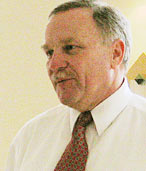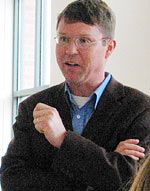American Attorney Team Crafts Afghanistan's Labor and Employment Law

Not many people can say they've written the laws of a country from the ground up, but that's what one team of American lawyers is doing in Afghanistan, a country that burned its laws along with other books under the Taliban regime. As part of an American Bar Association project to help draft a commercial code for the transitional Afghan government, attorney Mike Smith and law professor Rip Verkerke worked to craft the nation's new employment and labor code. They discussed their experience at a Virginia Employment and Labor Law Association lunch March 4 in Caplin Pavilion.
"Labor and employment laws really do give a good indication of what value you attach to individuals in your society," said Smith, who worked pro bono in Afghanistan with the aid of his law firm, Dechert, LLP. Smith said his experience made him optimistic about the country's potential for reform. "There are a lot of things wrong with the country that have to be addressed, but there are also a lot of good things about the country," he said.
Smith heard about the project from a colleague who emigrated from Afghanistan after her father, a resistance leader against the Soviet Union, was executed by Soviet forces. The U.N. and ABA asked her to get involved in women's rights issues in the country, as part of Dechert's pro bono effort there. Smith offered to help, and soon found himself named team leader in charge of drafting the employment and labor law code. Smith asked Verkerke, along with a University of Texas law professor and other Dechert lawyers, to join his team. Verkerke worked on wrongful termination, employment contracts, and whistleblowing while Smith focused on labor and union laws.
Smith said in crafting the laws they faced cultural obstacles as well as a lack of resources.
"We had some difficulty in terms of ascertaining what laws were in effect in Afghanistan, or whether any laws were in effect in Afghanistan in regards to employment and labor," he said. "Most of the judges, such as they are… had no law book…[They] made decisions as they saw fit."
Smith said they wanted to address several issues in the new laws, including the status of unions, wrongful termination, employment discrimination, wages and hours, and workplace health and safety. They discovered that the country had once based their legal system on the Napoleonic code. Afghanistan had a close relationship with Egypt in the mid-1970s and adopted their code; Egypt had founded their laws on the code because the French had occupied the country in the early 1800s.

One of the biggest obstacles for the team was translation, Verkerke said. When he first read the English-language translation of the Dari-language labor code, it was almost incomprehensible. Also, the lawmakers had to keep in mind "what's the reality on the ground." Verkerke noted that the "woeful" state of the judicial infrastructure made it difficult to find a basis for new laws or to expect enforcement of them.
The new laws needed to facilitate transition and change, Verkerke said, and he tried to avoid highly bureaucratic, complicated, restrictive provisions. On the other hand, the extreme level of poverty in the nation means "a social safety net is quite important."
American labor and employment laws were too complicated to use in Afghanistan. "You probably need to think from the ground up," he said.
Illiteracy, at an estimated 90 percent in Afghanistan, was also a substantial obstacle. "That makes written law and written documents inaccessible to a large portion of the population."
Many judges in the country are Islamic clerics, who often can't read themselves and also present barriers to enforcement. Political forces also shaped the way they wrote the law, Verkerke said, adding that the law drafters "are in a sense at the mercy of their hosts."
"I think there's some real prospect that this project will be ignored" or be ineffective outside of major cities, Verkerke said. "But I think it's worth a chance and certainly worth the effort."
Smith said he knew nothing about Afghanistan or Islam when he embarked on the project, but learned how crucial it was to visit the country to understand both how to craft laws and how to work with officials there in fine-tuning them. He spent eight days in Kabul, a bustling city of 2.2 million, and learned the effects of 25 years of war on the country. Bullet holes riddle government buildings; many of the people were single or double amputees because of land mines; the maternity and infant mortality rates are among the highest in the world. Outside Kabul and other major cities, the society has changed little since the Middle Ages. "Those are the realities that you deal with."
The government officials they worked with had few resources; many were ex-patriots who gave up comfortable lives in Europe or the United States to make $50 a month in Kabul.
Despite their poverty, Afghan leaders placed great faith in legal reform. After asking the Minister of Labor whether he wanted to base the new laws on those of surrounding countries, Smith got an "emphatic 'no'" via e-mail. "He said point-blank [that] those laws are not sufficiently progressive for what we want to achieve in Afghanistan."
Instead the drafters looked at laws from Cambodia and Vietnam, countries that also recently recovered from extended periods of war, as well as Egypt and Jordan.
Smith said when he showed the Labor Minister his draft proposal on employment discrimination, which included prohibitions against discrimination based on gender, race, and tribal affiliation, the minister replied that he wanted "the broadest possible protection for our people — including protection against religious discrimination.
Smith said he was very naíve about the role of women as well, and pointed out that before the Taliban regime, 40 percent of attorneys and doctors were women. "I think there's a tendency in the U.S. to look at the Islamic world as some sort of monolith, and that is not the case."
The team survived an attempt by a consulting firm working for USAID to eject them from the country; the firm wanted to win a multi-million dollar contract to do what Smith's team was doing for free. Smith also criticized some NGOs for acting more like travel agencies instead of integrating their workers into the country and helping its people.
When Smith met with Hamid Karzai, the Afghan president recognized the importance of creating a system of law to protect people and attract foreign and domestic investment.
The only concern about American involvement "was that we would prematurely disengage." Smith said he got a reality check when the Labor Minister asked him whether he would come back after his first visit. He did return, with his daughter, who accompanied him as an assistant but wore a head kerchief to honor the culture's traditions, although Smith pointed out that more and more women are going without.
The laws the team crafted are currently being fine-tuned by the interim government; after the team goes over the draft one more time, it will be forwarded to Karzai's cabinet, which will implement it by decree.
Enforcement will likely be difficult, with only 10 practicing attorneys in Kabul. "You're going to have to create a legal profession to represent people who are seeking enforcement of the laws." New courtrooms are housed in compounds, and lawyers and judges live there for security reasons.
Smith predicted an increasing struggle between the executive and judiciary branches, the latter of which is made up of mostly conservative religious clerics. The country's Supreme Court chief justice, who declared the Internet and satellite television "an instrument of Satan — has already sniped at parts of the Constitution. Smith predicted, however, that the traditionalist view will ultimately lose out.
"The most powerful instrument we have, if you want to call it propaganda, is CNN. It is everywhere," he said, and it shows our country's values, good or bad. "I don't see how the traditionalists can resist that tide of information."
Asked whether working on Afghanistan's new laws gave them any insight into American employment and labor laws, Verkerke said he began to wonder in cases of wrongful termination whether creating a mandatory severance pay system to cushion the impact of losing a job might be better than the current method of inquiring into employers' motives for firing an employee. "We just think it's natural because that's the way it's been" for many years, he said.
Smith urged students to look for such pro bono opportunities in their careers. "There's no better time to start than in law school," he said.
Founded in 1819, the University of Virginia School of Law is the second-oldest continuously operating law school in the nation. Consistently ranked among the top law schools, Virginia is a world-renowned training ground for distinguished lawyers and public servants, instilling in them a commitment to leadership, integrity and community service.


